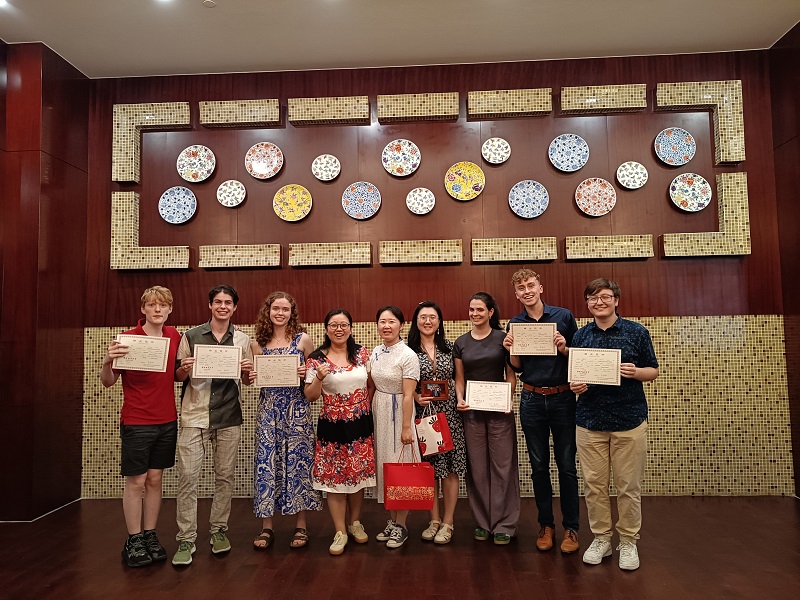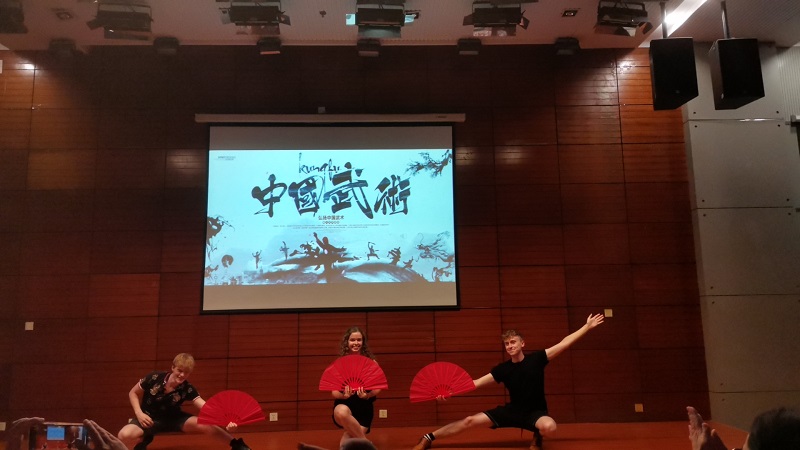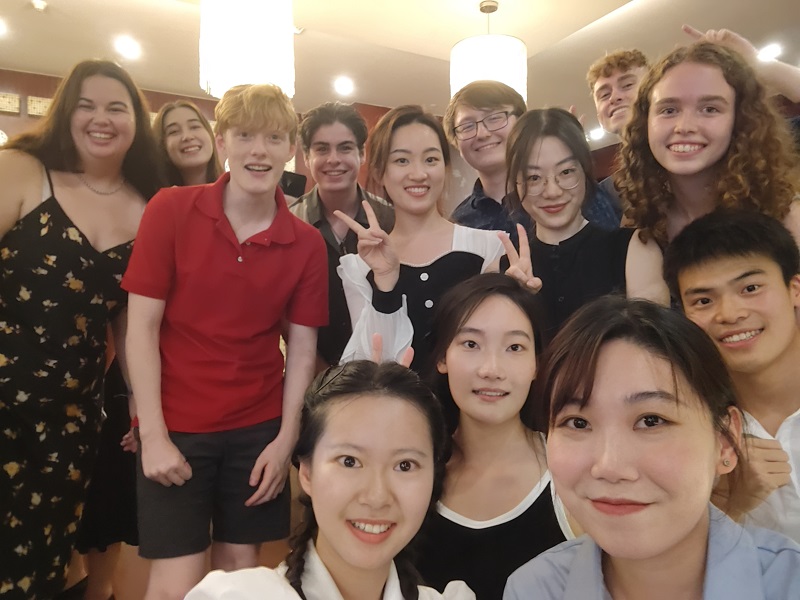[ad_1]
Written by Laura Romig (Brown College), Pupil Correspondent for CET Beijing, Summer season 2023
At the least I don’t have to offer my presentation proper after the woman who used physics equations. This was a comforting thought as I stepped to the rostrum at Renmin College. I used to be a flattened butterfly, pinned towards the PowerPoint display screen by the collective gaze of a room filled with economics professors and college students. In neat rows, behind placards printed with their names, my American classmates and Chinese language friends gleamed of their finest button-downs and costume pants, skirts, and ties. 5 years from now, I may think about every of them, younger professionals working in China or America, talking Chinese language in enterprise conferences. Someway, that thought was comforting, too. I caught a smile from classmates and academics, gripped the microphone, and commenced my presentation in Chinese language: Agriculture is perhaps humanity’s earliest type of know-how. It represents the harmonious cooperation between people and nature…
I spoke for eight minutes about the way forward for clever agriculture and its significance for US-China relations. Typically I momentarily forgot what I had deliberate to say; generally, I pronounced a phrase unsuitable or with the unsuitable tones, needed to backtrack and say it once more; my fingers shook across the microphone. However as I walked again towards my very own identify placard, heartbeat nonetheless skittering, I felt that I had crossed some boundary, struck new floor, although I wasn’t but certain the place.


Right here I’m presenting about clever agriculture and US-China relations, however you’ll be able to’t inform how nervous I used to be!
In a earlier weblog publish, I in contrast studying a second language to arriving on the foot of a mountain and starting to climb. As you scramble between rocks and vines, you’ll be able to reap the benefits of sure footholds and ropes for help— a dictionary of vocabulary, or the grammar buildings in your textbook, for instance. However these footholds can solely take you so excessive. As I lived in China for 2 months, talking Chinese language as a necessity, I slowly realized that lots of the footholds remaining above me relied on extra than simply descriptive sentences about myself or the world. I wanted phrases that meant motion, phrases with the ability to behave— speech acts.
What’s a speech act? A greeting, a promise, a request, a phrase of thanks, for a couple of examples. In our first languages, we choose up speech act etiquette via remark and immersion— the primary few years after start being the last word language immersion program. However whereas studying a brand new language later in life, now we have to discern the guardrails round speech acts via a mix of professors’ formal instruction and, if we’re fortunate, trial and error in a language surroundings just like the one cultivated at CET Beijing. And as we be taught to apologize, settle for a present, complain, and correctly greet a finest good friend or stranger, we discover ways to exist as fully-rounded folks in a second language, not simply caricatures— we climb the mountain.
Giving a speech shouldn’t be a speech act within the conventional definition, however public talking is, in my thoughts, one monumental motion, making a press release about your self to a crowd, a problem even in a single’s first language. When our academics had initially defined the chance to talk on the discussion board, I used to be at finest unenthused, at worst petrified by the notion of speaking for ten minutes in Chinese language to strangers. However with their encouragement, I ready a presentation. Talking at Renmin College’s Worldwide Financial Discussion board was a possibility I may by no means have had within the US— not solely to current on financial matters to Chinese language professors and college students but in addition to fulfill them and have conversations, and to take heed to their (far more completely researched, and illuminating) shows and views on international relations, the way forward for the financial system, of know-how. Giving my very own speech opened up avenues to conversations, connections, and friendships with the opposite college students, the younger professionals whose future imaginative and prescient I had seen standing on the podium.


American and Chinese language college students with college professors at Renmin College’s Worldwide Financial Discussion board
After I gave that presentation, I had my first foothold in Mandarin public talking. The subsequent week, our class visited a bookstore in preparation for our presentation the following day, through which we might suggest a literary work to the category. We perused the vintage maps of town, the Beijing historical past texts, and the youngsters’s tales that appeared extra appropriate to our character recognition capability; I wandered via the store’s stone courtyard, grass overgrown round a Buddhist tower craving skyward within the heart, a lone cat stretching in a patch of solar, serene. The subsequent day, I gave what I feel was my finest presentation in Chinese language I’ve made to date about Ursula Le Guin’s speculative fiction masterpiece, The Dispossessed. I didn’t write or memorize a script; my fingers didn’t shake. As an alternative, I simply spoke and molded my sentences to the concepts I already had, catching onto vocabulary phrases or grammar buildings that floated to the highest of my thoughts.
Finding out a language overseas, particularly in a well-planned program like CET, usually provides up alternatives such because the discussion board we joined, alternatives that appear daunting, appear to be additional work, alternatives far past the shut suburbs of your consolation zone. My recommendation is straightforward: if you happen to see a kind of alternatives, you’re fortunate. Take it.


My CET class, Chinese language 400, with our commencement certificates after finishing this system
Within the remaining week of this system, one other such alternative appeared to characterize our class by talking at our commencement ceremony, and I volunteered. However as I sat at my dorm desk to jot down the speech, fingers hovering over the keyboard and lamplight flickering over considered one of my final nights in China, I may really feel that this wasn’t just a few probability to develop my public talking. Someway, within the characters I typed out, within the few remaining moments I had in Beijing, within the actions I took over the following few days, I needed to say goodbye.
A goodbye is a speech act, too; tried-and-true, we follow it every day, parting methods after spending time collectively, seeing household off to work or on a visit. The on a regular basis, mundane goodbyes in Chinese language I understood— 再见 for goodbye, or its cutesy counterpart 拜拜, which feels like “bye-bye,” perhaps even 明天见, 会儿见, “see you tomorrow,” “see you in a bit .” However “see you in a bit” was truly a trick, a ploy to keep away from having to actually say goodbye, a reassurance that there was no want for farewell if you happen to would see the particular person once more so quickly. This speech I used to be writing was no on a regular basis goodbye. It was goodbye to a metropolis, to a rustic, to a tradition, a language; goodbye to a program, to associates from throughout the US or the globe all scattering off to their very own paths. It was “goodbye, all of us will probably by no means once more be in the identical house collectively.” “Goodbye, I don’t know after I’ll see you once more. I don’t know if I’ll see you once more.”
Methods to say goodbye like that in Chinese language? The reality was, I may hardly say it in English. In opposition to the clean web page, on which I had written a meager 大家好 (hey everybody), the cursor blinked up at me.
Leaving Chengdu after our program journey, we’d had a trial run at goodbye, saying farewell to our language companions and associates after 4 days collectively. Within the muggy darkish that July evening, my language associate had taken us to a comfort retailer to purchase breakfast for the practice, exchanged emails with me, and crowded us collectively for images. I had accomplished my finest to specific my gratitude for her and our time collectively. That was a template to be taught from, I believed— displaying take care of the chums of their departure, establishing methods to remain involved, commemorating with images, verbalizing gratitude. CET had given us an inconceivable activity— to say goodbye to those experiences and associates— nevertheless it had additionally, in its programming, given us this chance to learn the way.


My CET classmates and I carried out martial arts on the Chinese language cultural evening after the discussion board
After I completed typing a draft, I learn via it. The phrase I had used probably the most was merely 朋友 (associates). Associates, that means my American classmates and roommate, my Chinese language language associate, my martial arts class teacher, the opposite college students on the college, our academics. Accordingly, I texted two of my Chinese language associates then, asking if they may assist me edit the speech. After I met up with them the following night, beneath the acquainted fluorescent glow of the campus espresso store, they helped me elevate the speech and deal with everybody with respect and correct grammar. After an hour or so, I believed we had completed, however my good friend Jade gestured to the ending and stated: “I feel it’s best to add a poem.” She paused. “I do know the proper one.”
The poem my good friend typed out on the finish of my speech was this: 海内存知己,天涯若比邻. It means, roughly, that even when pricey associates are separated by the ocean and the forces of the world, their hearts are nonetheless simply as shut as neighbors are in distance. Saying it aloud at our commencement ceremony felt like an motion. I used to be talking that future into existence, our hearts as shut as neighbors. I may describe intimately that second after I gave the speech, nevertheless it appears to me that the speech wasn’t really the goodbye— it was the three of us crowded round my laptop display screen till the closing bell, to the baristas’ chagrin; it was the notes and presents exchanged between classmates and language companions on the ultimate day; the CET college students all squeezed across the tiny patio desk on the final evening, English interspersed with Chinese language after the Language Pledge ended; it was a gaggle of my associates planning a goodbye dinner for Monday night, and ultimately having dinner each evening after that till we left.
Whereas finding out overseas for a language, that language turns into extra than simply the vocabulary and grammar buildings trapped throughout the partitions of a college classroom. The language transforms into motion, into an extended checklist of actions you are taking daily simply to get from one place or scenario to the following. Whether or not that motion is studying to have the arrogance to talk in public, to order meals, or to say goodbye to pricey associates, greedy every new speech act is a step additional within the language, a step tough to take whereas finding out within the US. Overseas, the footholds you climb to be taught the language grow to be inseparable from the experiences and relationships in your personal life.




In Chinese language, the most typical phrase for goodbye, the phrase each first-semester Chinese language may inform you, is 再见. 再 that means “once more,” and 见 that means “see”: “See you once more,” in literal translation. Earlier, I stated this was dishonest at goodbye, pushing it off till the following time. However now it appears to me like a declaration— telling the particular person, regardless of the circumstances we could be in, regardless of the uncertainty of the world, I’ll see you once more. Saying goodbye simply means talking that future into existence. From my first semester of finding out Chinese language to my commencement ceremony at CET, I practiced this speech act. Saying goodbye, however that means “We are going to see one another once more.”
[ad_2]

